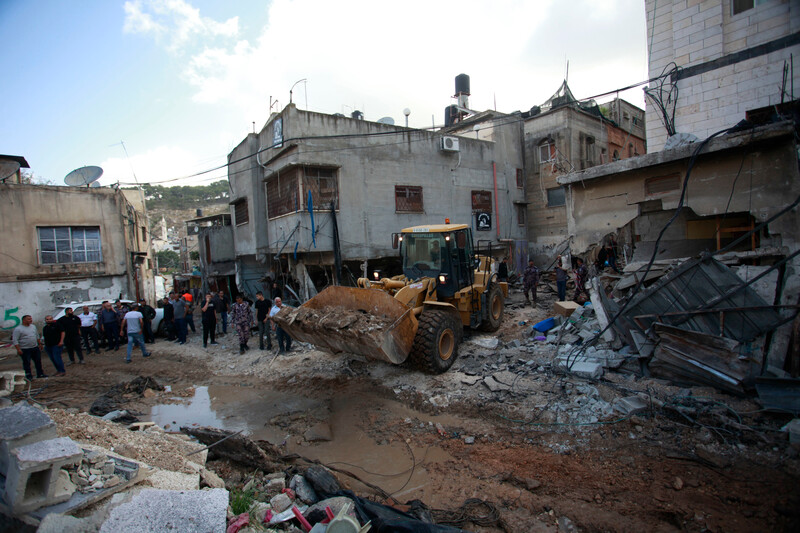The Electronic Intifada 6 June 2024

Roads and other civilian infrastructure have been badly damaged in Israeli attacks on Nur Shams refugee camp.
APA imagesIbtihal Omar has a daily struggle.
“I work in a nursery 500 meters away from my home,” she said. “But I feel like it is on the other side of the world.”
Roads and streets in Nur Shams – the refugee camp where Ibithal lives – have been badly damaged by the Israeli military.
Located near the city of Tulkarm in the occupied West Bank, Nur Shams has been subjected to numerous raids.
The raids are presented as operations against armed resistance groups in refugee camps.
During them, Israel inflicts widespread destruction on civilian infrastructure, including people’s homes.
Israel has also blocked the supply of water to the camp several times. On each occasion, it has taken weeks before the supply could be restored.
Electricity has been affected, too, as the Israeli military has cut wires and blown up transformers.
During an invasion of Nur Shams in April, Israel killed at least 14 Palesinians, including three children. That raid lasted for more than two days.
As well as invading from the ground, Israel has increased airstrikes since 7 October.
Israel has frequently used drones and other warplanes as tools of oppression against the West Bank in the recent past.
At a time when there has been intense international focus on Gaza, Israel has been ramping up its violence against Palestinians elsewhere.
More than 500 people have been killed in the West Bank, including East Jerusalem, since 7 October last.
“We are used to seeing martyrs lying on the ground in Gaza on television,” Ibtihal said. “Now we are seeing them with our own eyes in the streets of the camp.”
Ibtihal’s husband died a few years following an illness. She immediately sought a job so that she could feed her five children and ensure they could complete their education.
Her house is dilapidated. Damp is a major problem in the winter.
Many other houses in Nur Shams face similar issues.
A catastrophe that never ended
Ibtihal’s family come from Umm al-Zinat, a village near Haifa in historic Palestine. Its inhabitants were expelled by Zionist forces on 15 May 1948 – the same day that Israel was founded as a state.
Aged 35, Ibtihal has never been able to visit Umm al-Zinat, though she dreams of doing so. Vast numbers of Palestinians are in the same position.
In total, there are approximately six million registered Palestinian refugees. They comprise people who were uprooted during the Nakba, the ethnic cleansing which occurred between 1947 and 1949, and their descendants.
Almost 900,000 of the registered refugees live in the West Bank.
Nakba means catastrophe in Arabic. The catastrophe which befell Palestinians in the 1940s continues today.
Tariq Suliman is still trying to repair his house. Israel badly damaged it and many other homes in Nur Shams during the April invasion.
“More than 30 Israeli soldiers stormed my house and told me that they would use it as a military barracks,” Suliman said.
“First they forced me, my wife and my four children to stay in one room. Two hours later they kicked us out of the house and told us to find somewhere else until the military operation ended.”
The Israeli soldiers did not leave anything in place. They made holes in the walls of the house so that snipers could shoot through them.
When Suliman came back to the house and inspected the damage, he realized it was not habitable.
Nur Shams was set up in 1952 – to accommodate people from another refugee camp that was located near the West Bank city of Jenin. The tents in the other camp were destroyed by a snowstorm.
“The Israelis never leave us alone,” Suliman said. “But we still teach our children that our presence in the camp is temporary.”
Many of the camps’ residents have roots in the area around Haifa. They remain committed to the objective of returning to the villages and towns from which their families were uprooted during the Nakba.
The decision by the US to stop funding the United Nations agency for Palestine refugees (UNRWA) has caused great anxiety in Nur Shams. Its residents fear that the services available to them will be considerably reduced because of the agency’s financial difficulties.
Taha al-Irani, a community activist in Nur Shams, pointed out that children are unable to attend school when Israel invades the camp.
“You can sense the gloom on our streets,” al-Irani said. “We are not well.”
Fayha’ Shalash is a journalist based in the occupied West Bank.




